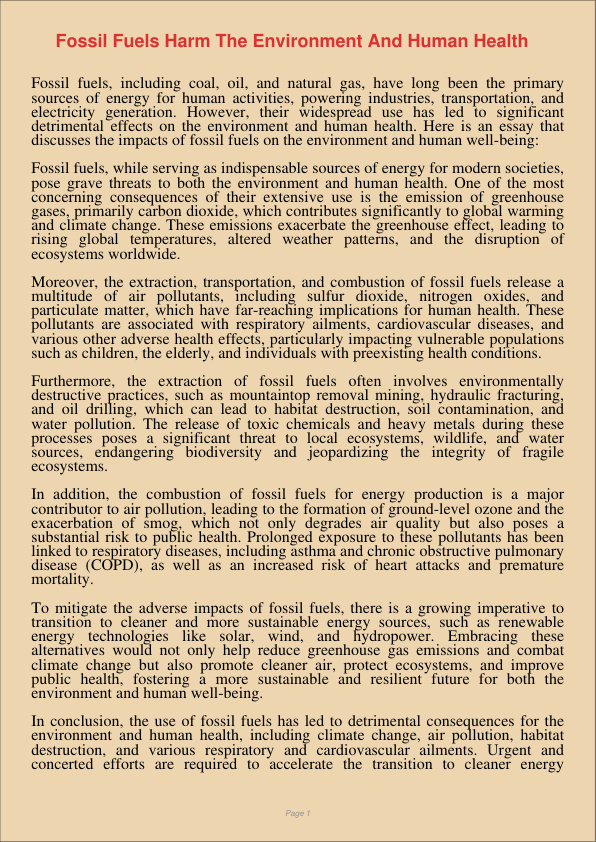Fossil Fuels Harm The Environment And Human Health
Dec 31, 2023
fossil fuels harm
human health
Business
History
Fossil fuels, including coal, oil, and natural gas, have long been the primary sources of energy for human activities, powering industries, transportation, and electricity generation. However, their widespread use has led to significant detrimental effects on the environment and human health. Here is an essay that discusses the impacts of fossil fuels on the environment and human well-being:
Fossil fuels, while serving as indispensable sources of energy for modern societies, pose grave threats to both the environment and human health. One of the most concerning consequences of their extensive use is the emission of greenhouse gases, primarily carbon dioxide, which contributes significantly to global warming and climate change. These emissions exacerbate the greenhouse effect, leading to rising global temperatures, altered weather patterns, and the disruption of ecosystems worldwide.
Moreover, the extraction, transportation, and combustion of fossil fuels release a multitude of air pollutants, including sulfur dioxide, nitrogen oxides, and particulate matter, which have far-reaching implications for human health. These pollutants are associated with respiratory ailments, cardiovascular diseases, and various other adverse health effects, particularly impacting vulnerable populations such as children, the elderly, and individuals with preexisting health conditions.
Furthermore, the extraction of fossil fuels often involves environmentally destructive practices, such as mountaintop removal mining, hydraulic fracturing, and oil drilling, which can lead to habitat destruction, soil contamination, and water pollution. The release of toxic chemicals and heavy metals during these processes poses a significant threat to local ecosystems, wildlife, and water sources, endangering biodiversity and jeopardizing the integrity of fragile ecosystems.
In addition, the combustion of fossil fuels for energy production is a major contributor to air pollution, leading to the formation of ground-level ozone and the exacerbation of smog, which not only degrades air quality but also poses a substantial risk to public health. Prolonged exposure to these pollutants has been linked to respiratory diseases, including asthma and chronic obstructive pulmonary disease (COPD), as well as an increased risk of heart attacks and premature mortality.
To mitigate the adverse impacts of fossil fuels, there is a growing imperative to transition to cleaner and more sustainable energy sources, such as renewable energy technologies like solar, wind, and hydropower. Embracing these alternatives would not only help reduce greenhouse gas emissions and combat climate change but also promote cleaner air, protect ecosystems, and improve public health, fostering a more sustainable and resilient future for both the environment and human well-being.
In conclusion, the use of fossil fuels has led to detrimental consequences for the environment and human health, including climate change, air pollution, habitat destruction, and various respiratory and cardiovascular ailments. Urgent and concerted efforts are required to accelerate the transition to cleaner energy alternatives and implement stringent environmental regulations to mitigate the profound impacts of fossil fuel use on the planet and safeguard the health and well-being of present and future generations.
